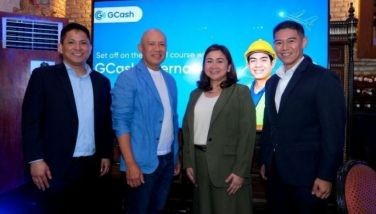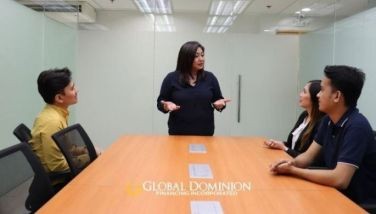Philips makes Visayas calamity-ready with improvised solar night lights
MANILA, Philippines - Recycled plastic soda bottles plus water plus simple circuit board plus sunlight. The equation gives cheap, reliable, and safe solar night light in the absence of electricity.
Dutch firm Philips gives Typhoon Yolanda victims a glimpse of a brighter future, as it links with social entreprenuer Illac Diaz for the installation of improvised solar night lights in their bunkhouses.
The technology firm chose Diaz’s Liter of Light initiative as the project to support for the firm’s “Meaningful Innovation†program in the Philippines.
The program is meant “to develop health and well-being solutions that can benefit the public, especially those belonging to the marginalized sectors,†says Philips country manager Fabia Tetteroo-Bueno.
Bueno says Philips will be infusing some LED technology into the solar night light to improve the device and make it an even better alternative to kerosene. The 123-year-old lighting company also aims to further simplify the installation of the solar night light, cutting the assembly steps from 20 to just around five.
Bueno says this should make the project an even more viable livelihood project for the community and a more handy emergency device when calamities strike again.
She stresses that Philips’ partnership with Liter of Light to help the Yolanda victims will not in any way affect its solar lighting production in the Philippines, as the company does not focus on this market segment locally.
As part of Philips’ corporate restructuring strategy worldwide, the “Innovations that matter to you†or “Meaningful Innovation†marketing campaign was earlier introduced in Indonesia, Korea, Thailand, and Singapore.
In Thailand, Philips came up with a free mobile hospital for indigent senior citizens, especially from areas affected by floods. The light company also lit up a public park with solar-powered LED lampposts, making the place safe, even at night.
The company intends to do something similar in the Philippines. But for now, it will depend on what would best fit the areas hit by typhoon Yolanda, with emphasis on doability and impact.
Last November, Philips launched a web-based search for the best idea to help Yolanda-affected areas to recover from the calamity’s devastation. Out of 1,057 received, Diaz’s improvised solar night light was picked as the first project to support in the country.
“At Philips, we don’t just innovate for innovation’s sake,†says Bueno. “We innovate for your sake. We do this by listening and understanding the needs of people, families, and communities.â€
Giving back
Philips’ “Innovation Plus You†tagline is part of the company’s worldwide rebranding strategy, which started over a year ago, says Gela Isidro, Philips’ corporate communications manager for the Asean and the Pacific. That was after the global industrial giant let go of its once-core home entertainment business—i.e. televisions, radios, and its life-changing innovations CD and DVD players—amid overwhelming competition from Asia, particularly Korean brands Samsung and LG.
“We came up with the ‘Innovations Plus You’ tagline to show that we are a technology and innovation company that cares,†says Isidro.
The 122-year-old company is simply giving back. The $27.54 billion conglomerate from Netherlands is, itself, an industrial survivor. From depleting margins, Philips has bounced back, announcing third-quarter profits of $380 million in 2013, almost three times its same-period earnings in 2012.
Reports say the increase was driven by sales in household appliances in emerging markets, where much of the competition had come from.
Dropping the word “electronics†from its name and recently introducing a new starry shield logo in collaboration with partners Ogilvy, Interbrand, and OneVoice, Philips is now shifting its focus to healthcare, consumer lifestyle, and lighting—especially smart lighting.
Globally, the company hopes to benefit from the growing popularity of the light-emitting diodes (LED), amid mounting concerns on resource conservation and climate change. After all, Philips reportedly owns most of the world’s patents on LED, which is said to have less carbon emission than incandescent bulbs. In 2012, Forbes Magazine gave its most innovative product award to Philips’ LED product called “Hue,†which reportedly demonstrates the psychological effects of light hues on people. This year, Philips was again named Most Innovative Company by trade magazine Fast Company.
Shift to healthcare
While medical devices consisted its first diversification moves with the production of X-ray machines in 1931—long before it dealt in radios, televisions, and stereos—Philips is now banking on the growing demand for healthcare devices.
“Nowhere is the shift in Philips more visible than in its healthcare division,†observes Agence France Presse, “which now accounts for about 43 percent of investments.â€
“Philips has seen a steady rise in full-year figures for its healthcare solutions, from 6.6 billion euros in sales in 2007 to a staggering 9.9 billion euros (in 2012),†the AFP reports, adding that Philips has clinched a series of mega-deals with hospitals around the world to provide medical equipment, such as 3D holographic projections for surgeons.
In the Philippines, says Isidro, Philips has linked with the National Kidney and Transplant Institute (NKTI), Philippine Heart Center, St. Luke’s Medical Center, and Capitol Medical Center for the provision of advanced medical equipment like Magnetic Resonance Imaging (MRI) machines and mammography units, as well as the holding of breast cancer awareness campaigns.
At the Philippine Heart Center, she adds, Philips has installed a “Heal-Well Lighting System,†which applies scientific findings that lighting affects speed of recovery.
Obsession for wellness
As for consumer lifestyle, Philips has recently introduced locally the “Airfryer,†a kitchen device that aims to lessen the use of oil in cooking. The baby and mother-care brand Avent is also by Philips. The company sees a world of growing middle class with obsession for healthy living.
Isidro says Philips’ products are now all anchored on consumer health and well-being, following recent studies on trends in lifestyle and life expectancy. She cites findings by the World Health Organization that by 2025, no one will have a lifetime expectancy of less than 50 years because of technology and that two of three people worldwide will be living in urban cities, stressing the need for more services like electricity and liveable conditions, including climate-readiness.
- Latest





























